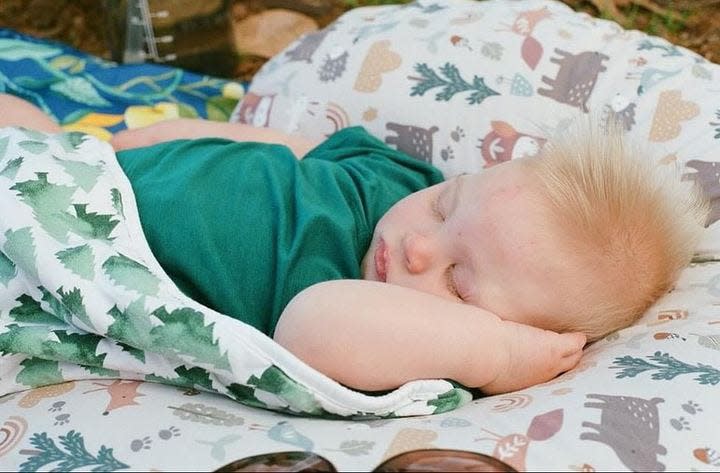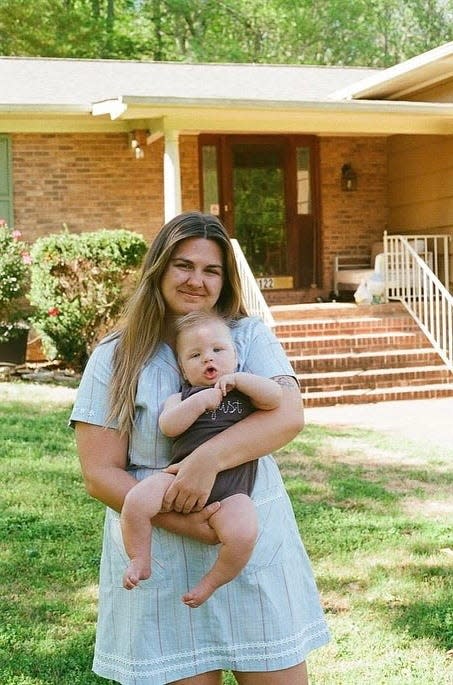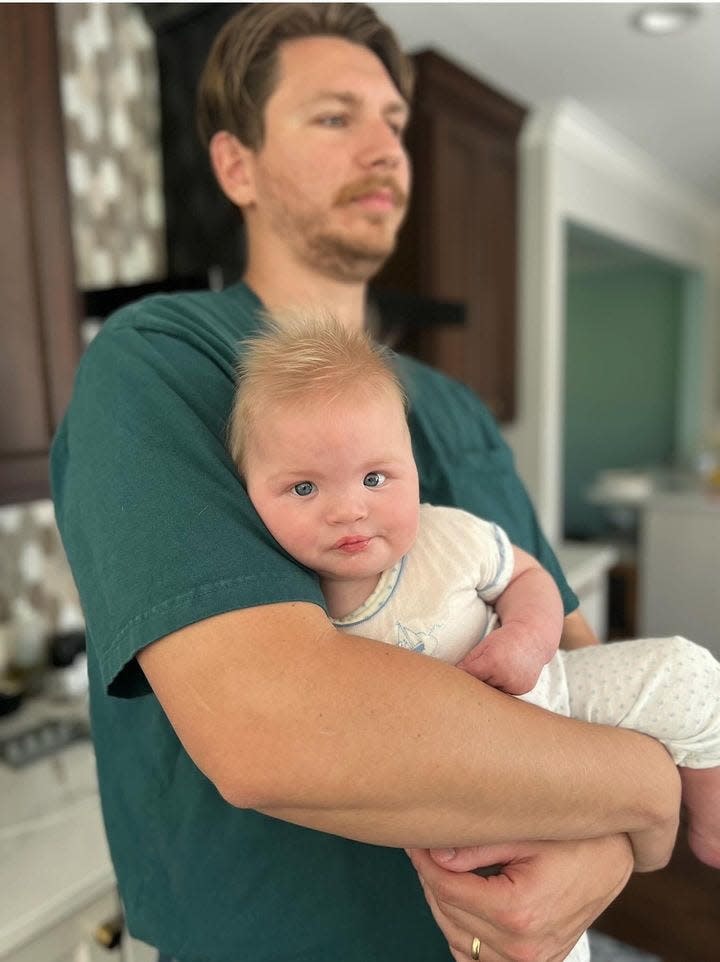Shelby mother talks about struggles of son's rare diagnosis



For Maggie Hohne, motherhood was an eagerly anticipated journey filled with hopes and dreams for her son.
She had a glowing pregnancy and along with her husband, Adam, they were excited to be first time parents and were ready to welcome their son, August, to the world in the summer of 2023.
Over the course of the following nine months, however, the couple has had to throw out all their expectations and take life day by day as they find themselves unexpectedly parenting a child with a rare condition.
Maggie Hohne said she had a “picture perfect” pregnancy, with no complications and good health.
“I loved being pregnant,” she said. “I just really enjoyed every bit of it.”
August was diagnosed with a 5p-, or "Cri-du-chat syndrome." Hohne said it took a long time to bond with her baby, and she felt very alone.
She wants to share her story with other mothers in the hope they won't feel so alone.
“I talk about it now so other moms know, if that bond isn’t instant it’s OK,” she said.
Maggie Hohne said August was due in early August of 2023, but following an annual summer solstice neighborhood potluck party, her water broke in the early morning hours of July 15. After calling her doula the following day, she was told to make plans to go to the hospital.
Hohne said they were not prepared for his early arrival and did not even have a bag packed. It was the first in a series of plans that went out the window. They spent the morning going to yard sales and the farmers’ market before packing a bag and heading to the hospital.
She said following a quick and easy labor, August was born at 8:05 p.m. on July 15 and weighed in at 5 pounds.
Hohne said although August was struggling to eat post-labor, everything seemed fine initially, and she was soon transferred to the postpartum wing.
A pediatrician came in the following morning and did an assessment and said her baby looked great, and everything was on track. But he still couldn't feed, no matter what they tried, and they were having a hard time keeping his body temperature regulated and had to keep him double swaddled so his temperature wouldn't drop.
“The really sad, human side of it is I didn't have clothes that fit him,” Maggie said. “Out of all the clothes I bought, all the ways I prepared, I brought the smallest clothing to the hospital and it was huge.”
When a new pediatrician came in the next day, she told them they would not be going home as tentatively planned, and she didn’t know when they would be going home. An assessment revealed low tone, and she told them he looked younger than his gestational age.
“This is the kicker, she told me, a three-day new mom, that his eyes were far apart, and he looked a bit syndromic and she wanted to do testing. Nine months later it's still something that really affects me,” she said.
The test would take a few weeks to come back.
Her newborn was still struggling to eat, and they had to syringe feed him. They were told they would be transferred to Levine Children’s Hospital in Charlotte the following day as they didn’t have the necessary equipment to care for him, but they were reassured that it wasn’t an emergency.
In the early morning hours of Thursday, Maggie said she woke up in a cold sweat and saw a doctor standing in her room. She was told her son was exhibiting seizure-like activity, and they were sending him to Levine’s by helicopter immediately.
Adam had gone home to take care of their dogs and sleep, and she had to call him back to the hospital.
“Five minutes after he showed up, we walked outside into the hallway and August was in a little isolette on a stretcher, and he was being wheeled away,” she said. “I honestly never imagined that I would leave the hospital without my child, and to watch him be wheeled away for a helicopter ride? That was very hard.”
The next morning, they walked into Levine’s and saw their tiny baby in an isolette with wires hooked up to him.
“He was born 5 lbs but at that point he was 4,” Maggie said. “He was really small. We met our nurse, and they were lovely. They really value families being involved in the care of their children.”
He was given a feeding tube through his nose to help him get calories and went through a battery of tests for a diagnosis and to rule out various other potential conditions.
They settled in for the long haul, renting an Airbnb, having a friend assist with sending out daily text updates and finally calling in family from Tennessee to rally around them.
“Slowly we were letting people in. We realized this is not a normal situation, this is not OK, we are not OK,” she said.
Physcially, she was doing well.
“My body did not look like I had given birth five days prior. I was feeling great. Adam and I were very solid, very supportive of each other. We were both very scared, very traumatized. We went to read Goodnight Moon on his one week birthday, and I remember us both like just sobbing in the middle of the NICU at like 8 at night.”
Then came the diagnosis.
“I remember it was a Sunday, and Adam and I were sitting on the back porch eating breakfast,” she said.
The doctor called and asked them when they would be coming in that day and told her they had gotten the results of the genetic test. When they arrived at the hospital, a geneticist took them into a family consultation room and told them their son had a deletion on his fifth chromosome and he had 5p-, or “Cri-du-chat syndrome,” which is French for cry of the cat, because some babies with the condition sound like a kitten when they cry.
“So that's when we found out,” she said. “By far the worst day of my 27 years. It is a rare genetic disorder. It's not something that's picked up in a test or on a scan. It’s random. It happened at conception. Because it is rare, there is very little research on it. I was just hysterically sobbing. I couldn't stop crying.”
Initially she was selective about the people she shared the diagnosis with, and she grappled with its implications. She said she couldn't see any positive in the situation.
“It was just impossible,” she said.
She said 5p- is a spectrum syndrome so it affects every single person differently. Some people have kidney problems or heart problems. There are across the board developmental delays. Intellectual disability and speech delays are common.
“Behaviorally, he could develop autism, OCD, self harming tendencies. Some kids never potty train and are completely dependent on their parents for the rest of their lives,” she said. “Others grow up to be decently independent. Finding out when your child is less than a month old that all these hopes and dreams that you had for him could just be completely different. It still is hard for me. I always wanted him to be a Jefferson Bee. I always wanted him to be a dancer and musician like me and Adam.”
Now, the future is filled with unknowns.
August was still unable to eat on his own, so they made a decision for him to have surgery to add a feeding tube.
“I remember we went with them from the NICU to the surgery pavilion. I remember we were waiting to get onto the elevator, and he was in isolette and first time he looked at me. He reached his hand out and touched the plastic of the isolette, and he just rested it there. I feel like that was the first time that he looked at me and knew I was his mom.”
She said he recovered from surgery well, but her mental health was in the gutter. She said she questioned, why her, why her son, why did it have to happen to them.
“I had pretty severe rejection of him for a long time. I didn’t want to take him home. I didn't want to spend time with him. Just very severe rejection,” she said.
She felt her son deserved a mom better than her, a mom who could love him exactly as he was. She said she is a big advocate of medicine, therapy and mental health care and found a doctor who specialized in postpartum care.
“I am a big advocate being open about mental health. Even when suicidal, when I didn’t want August as my son and felt he deserved a better mom, I was very open about feeling that way," she said.
Once discharged, there were a slew of appointments that followed. Appointments with audiology, pediatrician, GI doctor, therapy and more.
It was a difficult transition.
“We came home and that first month, the entire month of September, I really reverted back to like I can't do this," Maggie said. "I was extremely suicidal. I didn't want August. I felt he needed a better mother. Adam really held down the fort for that first month. He was August’s primary caretaker, and he was my primary caretaker. I was not in a place where I could do any of it.”
She was processing the diagnosis, the feeding tube and the reality of her new life.
She said every time she went out with her baby, she felt judged.
Still, there were bright spots.
“One of the things I want to emphasize, me and Adam and August would not be where we are today if it wasn't for the people in Shelby who are our family. The people who brought us food, asked about him, told me he looked cute and just supported us and really cared for me. That is the light at the end of the tunnel, no matter how he grows up, he will always be loved,” Maggie said.
She said becuase of his disability, she worried he wouldn’t be loved or have friends.
“We’ve been shown in past nine months there are people who care for him and people who care for me,” she said.
Over the course of the first nine months of her son’s life, Hohne said she had to say goodbye to most of her plans and expectations, from big things to small, including breastfeeding, eating foods, and reaching milestones “on time.”
He recently had a third swallow study. He also went to audiology to check on his hearing as he could be deaf. Next month he has a kidney ultrasound.
“My life will just continue to be this question mark. We just wait and see,” she said. “It does make it a little easier to celebrate when he does something. I still remember the first time he lifted his head up after tummy time. It was the weekend after Thanksgiving. He was four months old. He didn't lift his head up until four months. He popped his head up. Adam and I lost our minds… we have to have the mind of celebrating those wins. While I have processed and have to come to an extent come to terms with things. I go through phases.”
She said there are highs and lows. Some weeks are easier than others, and it’s still a process to let go of expectations and not worry about what other people think and how they might judge her.
When she sees friends or family with their own children, she said it can be difficult to see them doing things her son can’t.
“It is so hard not to compare,” Maggie said. “Comparison is the thief of joy.”
She’ll have weeks where she’s doing well and then hit a low place with the diagnosis, which often happens when they have a lot of appointments.
“I do feel like it's an ebb and flow,” she said.
She said another thing she had learned is to accept help with no pressure to return the help.
“It’s so hard to admit I need help and so hard for me to accept help and so hard not to feel like I need to help them in some way, like it’s a debt that's owed,” she said.
She said she wants to share her story to help other mothers who might be struggling with a rare diagnosis and all the challenges and emotions that come with that.
“I have learned to not have expectations. I was expecting so many things to go so differently. I don't have any expectations for the future at all. If I'm caring for August until my death, I have to let go of wanting expectations for him.”
This article originally appeared on The Shelby Star: Shelby mother talks about struggles of son's rare diagnosis

